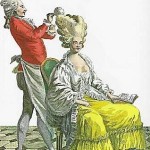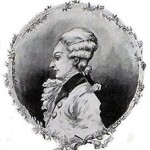Our gratitude for this thought-provoking blog to Will Bashor. Please see his bio with links to his book and website below.

You spend two to three years researching, writing, editing, and rewriting your biography about an obscure hairdresser that lived in France over 200 years ago. And then the big question pops up in your first interview: “Why did it matter to you?”

1. Does a Biography Matter? A life must first be lived, and then it must be written, and then it must be read before any biography ever really matters. A biography, by definition, is the history of someone’s life, but it is also similar to the image of a landscape in an artist’s imagination, one that needs to unravel on his blank canvas. A biography is indeed a history, but it is also a history of a life lived, requiring imagination and inspiration. To tell about an obscure hairdresser’s yard-high coiffures, the infamous poufs, at the court of Versailles is one thing, but to have the hairdresser himself stand out and shine among the celebrated courtiers, including Marie Antoinette and Louis XVI, is quite another.
2. Why Leonard? There are indeed important men and women in history whose lives must be written for their impact on our own lives, but there are also lives that are valuable not for any contributions but rather for the manner in which they throw light upon a certain period in history. We can read about the tragic effects of Marie Antoinette and Louis XVI’s extravagant reign leading to the Revolution, but do we truly understand the reign without a glimpse of the lives of the covetous court favorites, the faithful royal servants like Leonard, or the famished peasants crying out for bread (unfortunately while Leonard was thought to powder the queen’s poufs with their dear flour)?

3. Why Me? Simply answered, Leonard died in 1820 and cannot speak for himself. Granted I am not a distant relative, or even a hairdresser, but after coming across a lock of Marie Antoinette’s hair in a Parisian museum, I remembered that she almost fainted at the sight of the red-hooded executioner in her prison cell one cold morning, and she recoiled with horror when he asked her to turn around so he could cut her hair, necessary to ensure that the guillotine’s blade would work properly. Her hair. It was the talk of all Europe when she held her elaborate court at Versailles. But it would be the last thing to go, and here was a lock of it. I was spellbound, and here was an artist’s image that had to be painted — or written on a blank page of paper.
4. Why You? If you ever have the opportunity to read this biography, shouldn’t there really be three individuals joining in on the experience: Leonard who experienced the glamour, the decadence and the danger of his times; the author who recreates his story; and you in your easy chair bringing his story to life? When you see the Mona Lisa or the Venus de Milo, doesn’t the image become yours forever? Likewise, when you read a biography to the point where an obscure hairdresser can become a living, breathing, and credible being, although you put the book back on the shelf, doesn’t he remain yours forever? It is surely great to walk among the living, but it is also wonderful to know that there were others before us. Perhaps reading a biography matters because it gives us a background for our own lives, and we become, hopefully, part of what Shakespeare calls the “great humanity.”
Will Bashor
5 Comments
Leave a Reply Cancel reply
You must be logged in to post a comment.










Fantastic post, Will! Thank you, as always, for your thoughts and insights! Can’t wait to read “Marie…”
I absolutely loved reading Will Bashor’s book about one of my favorite subjects — Marie Antoinette. Great blog post, too. A must read for anyone interested in MA, or in that period. Seeing that world thru the eyes of Leonard gives it a personal reality missing in straight-forward history books.
Hello Ben, I so enjoyed your STC class in NYC! I can’t believe how helpful it was. In fact, my script has made it to the 2014 Creative World Awards Finals.
That is fantastic! So happy to hear of your success and thanks for sharing. Many good things to come. Please keep us updated!!
Happy to see that the art of biography is in capable hands! I look forward to your next effort.